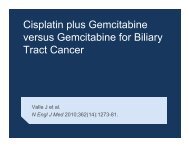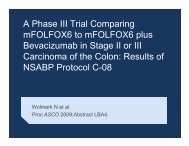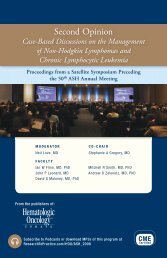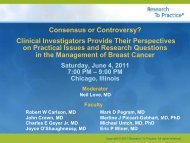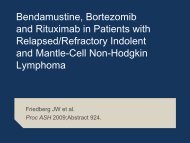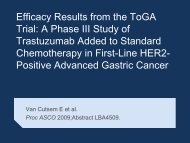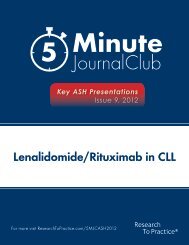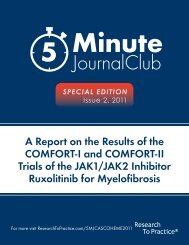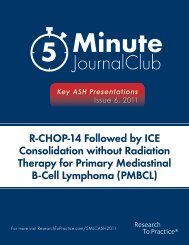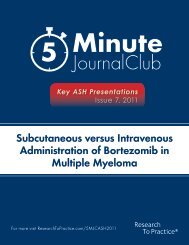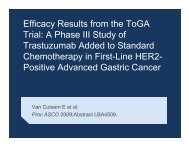Second Opinion
Second Opinion - Research To Practice
Second Opinion - Research To Practice
- No tags were found...
Create successful ePaper yourself
Turn your PDF publications into a flip-book with our unique Google optimized e-Paper software.
From the practice of Samuel N Bobrow, MDA 37-year-old woman is diagnosed with a 0.4-cm, moderately differentiated IDC. Thetumor is ER/PR-negative and HER2-positive by FISH.Track 73DR LOVE: How do you think this patient should be treated?PROF CROWN: I would find it difficult to justify the use of adjuvant trastuzumabfor a patient with a tumor smaller than five millimeters. In fact, althoughI’m in the minority on this, I would not recommend any systemic therapy forthis patient outside of a clinical trial.I believe many people would recommend the TCH regimen for this patient. It hasa manageable side-effect profile. In our BCIRG 006 trial, we’ve seen a small riskof leukemia for the anthracycline-containing arms and none as yet with TCH.Also, the rate of cardiac failure is four out of 1,000 patients and the cardiactoxicity associated with trastuzumab appears to improve with time in most cases,which suggests that the qualitative nature of the trastuzumab cardiac lesion isdifferent from that seen with an anthracycline.DR LOVE: Would you consider using trastuzumab alone?PROF CROWN: We have no data in the adjuvant setting for trastuzumabmonotherapy. I believe a good rule is that if a patient satisfies a practitioner’scriteria for offering adjuvant chemotherapy and has HER2-positive disease,trastuzumab should be administered.Track 87DR LOVE: George, how would you approach treatment for this patient?DR SLEDGE: First, I would tell the patient that we have no data with tumorsthis small but that the data we do have across a variety of sizes and nodalstatuses show us that trastuzumab is beneficial. Her risk of recurrence may beless because the tumor is small, but when a patient tells you she wants no stoneunturned, then you have your answer.I probably would not recommend anthracycline-based chemotherapy because ofthe frightening possibility of turning this young woman into a cardiac cripple.Rather, I would use a regimen such as TCH. I’m also comfortable with thisregimen for patients with larger tumors and positive nodes, up to a point.DR LOVE: When was the last time you used an anthracycline as treatment for aHER2-positive tumor?DR SLEDGE: It’s probably been 18 months or so, but I must add that I alsohaven’t seen many patients with early breast cancer and 13 positive nodes.15



